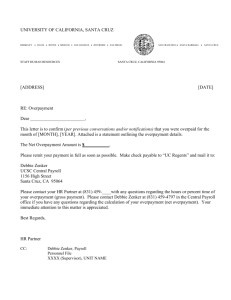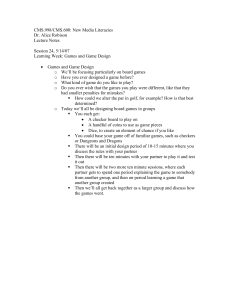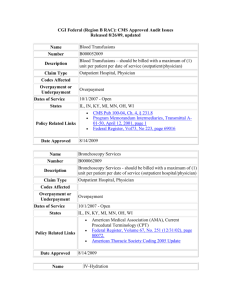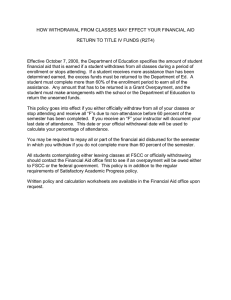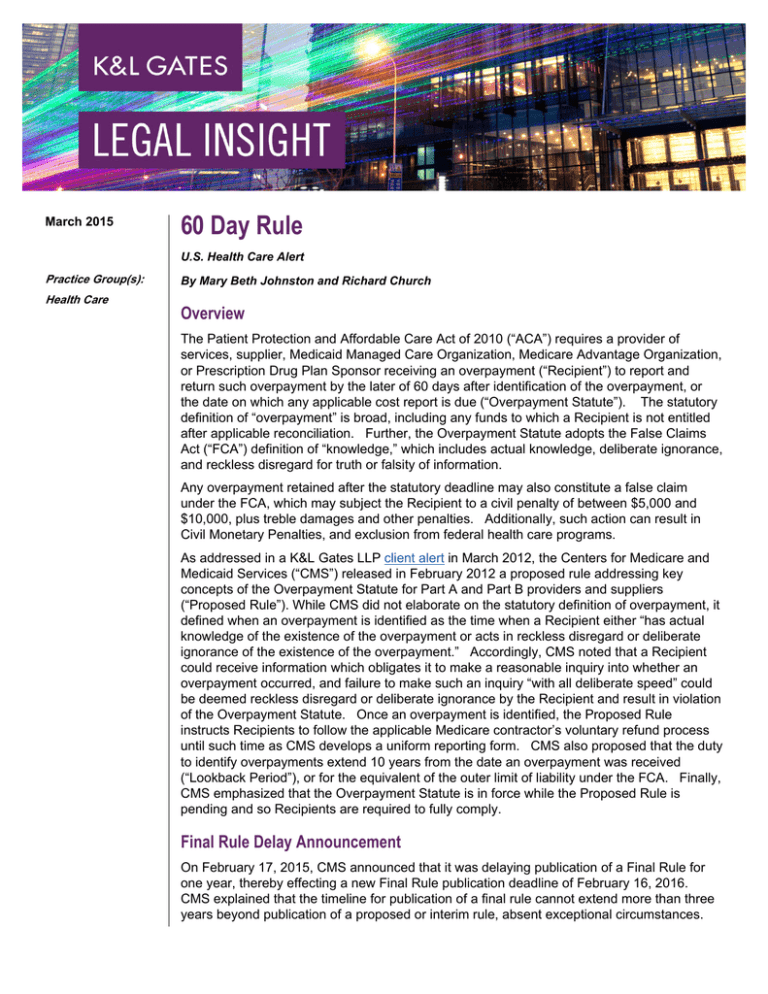
March 2015
60 Day Rule
U.S. Health Care Alert
Practice Group(s):
Health Care
By Mary Beth Johnston and Richard Church
Overview
The Patient Protection and Affordable Care Act of 2010 (“ACA”) requires a provider of
services, supplier, Medicaid Managed Care Organization, Medicare Advantage Organization,
or Prescription Drug Plan Sponsor receiving an overpayment (“Recipient”) to report and
return such overpayment by the later of 60 days after identification of the overpayment, or
the date on which any applicable cost report is due (“Overpayment Statute”). The statutory
definition of “overpayment” is broad, including any funds to which a Recipient is not entitled
after applicable reconciliation. Further, the Overpayment Statute adopts the False Claims
Act (“FCA”) definition of “knowledge,” which includes actual knowledge, deliberate ignorance,
and reckless disregard for truth or falsity of information.
Any overpayment retained after the statutory deadline may also constitute a false claim
under the FCA, which may subject the Recipient to a civil penalty of between $5,000 and
$10,000, plus treble damages and other penalties. Additionally, such action can result in
Civil Monetary Penalties, and exclusion from federal health care programs.
As addressed in a K&L Gates LLP client alert in March 2012, the Centers for Medicare and
Medicaid Services (“CMS”) released in February 2012 a proposed rule addressing key
concepts of the Overpayment Statute for Part A and Part B providers and suppliers
(“Proposed Rule”). While CMS did not elaborate on the statutory definition of overpayment, it
defined when an overpayment is identified as the time when a Recipient either “has actual
knowledge of the existence of the overpayment or acts in reckless disregard or deliberate
ignorance of the existence of the overpayment.” Accordingly, CMS noted that a Recipient
could receive information which obligates it to make a reasonable inquiry into whether an
overpayment occurred, and failure to make such an inquiry “with all deliberate speed” could
be deemed reckless disregard or deliberate ignorance by the Recipient and result in violation
of the Overpayment Statute. Once an overpayment is identified, the Proposed Rule
instructs Recipients to follow the applicable Medicare contractor’s voluntary refund process
until such time as CMS develops a uniform reporting form. CMS also proposed that the duty
to identify overpayments extend 10 years from the date an overpayment was received
(“Lookback Period”), or for the equivalent of the outer limit of liability under the FCA. Finally,
CMS emphasized that the Overpayment Statute is in force while the Proposed Rule is
pending and so Recipients are required to fully comply.
Final Rule Delay Announcement
On February 17, 2015, CMS announced that it was delaying publication of a Final Rule for
one year, thereby effecting a new Final Rule publication deadline of February 16, 2016.
CMS explained that the timeline for publication of a final rule cannot extend more than three
years beyond publication of a proposed or interim rule, absent exceptional circumstances.
60 Day Rule
Further consideration of “significant policy and operational issues … in order to address all of
the issues raised by comments to the proposed rule and to ensure appropriate coordination
with other government agencies,” such as the Office of the Inspector General and the
Department of Justice, were cited as the exceptional circumstances warranting the delay.
CMS emphasized that while it assesses the form of its Final Rule, the Overpayment Statute
remains in force, and providers are required to comply during pendency of the Final Rule.
CMS received 390 comments through the closing of the Comment Period on April 16, 2012,
due in large part to the significant regulatory implications of CMS’s position on the Lookback
Period and the substantial penalties Recipients could face if the Proposed Rule were
implemented in its current form, which CMS cited as another contributing factor to the further
delay in publishing the Final Rule. While the comments are many faceted, several
conceptual areas of concern were repeatedly raised by providers, the most prevalent of
which are outlined below.
Comments—Lookback Period and Cost of Compliance
Commentators virtually unanimously agreed that the 10-year Lookback Period is
inappropriate. Many objections to the Lookback Period cited inconsistency with other
Medicare policies and noted that the 10-year outer limit of the FCA is intended to capture
intentional fraud, not inadvertent retention of overpayments. Comments also highlighted the
administrative burden such a Lookback Period would impose on providers, and some even
suggested that its implementation could result in a decrease in providers willing to accept
Medicare patients. In a similar vein, many suggested that CMS dramatically understated the
cost for providers to comply with the Proposed Rule, and some tied this cost back to the long
Lookback Period. Furthermore, most commentators objecting on this basis suggested a de
minimis threshold below which providers would not be required to report overpayments,
arguing that such a threshold would minimize the administrative burden on both providers
and CMS.
Comments—Identification Defined and Application of FCA Knowledge
Standard to Identification
CMS’ definition of identification and application of the reckless disregard and deliberate
ignorance standards to identification was a topic of concern to many commentators. The
potential for premature invocation of the 60-day deadline was repeatedly cited and requests
to start the 60-day period after conclusion of a review confirming overpayment were
common. Additionally, it was noted that actual knowledge should be required for an
overpayment to be “identified” and that application of the reckless disregard and deliberate
ignorance standard goes beyond Congressional intent.
Comments—Interaction of Proposed Rule with Other CMS Post-Payment
Review Procedures
Finally, a significant number of comments addressed other CMS post-payment review
procedures and uncertainty regarding how the Proposed Rule interacts with such
procedures. Existing post-payment review procedures involving MACs and RACs were of
particular concern, inasmuch as such reviews frequently result in appeals when an
overpayment determination is reached, and it is not uncommon for an adverse appeals
2
60 Day Rule
decision to be overturned at the administrative level. Along this line, other comments
expressed concern about credit balance reporting procedures and suggested that any
overpayment which would be subject to reporting on Form 838 be exempt from the Proposed
Rule.
Recommendations
The bases for CMS’s delay—coordination with other key federal health care enforcement
agencies and the volume of provider comments—make clear the potential importance of how
CMS resolves the key regulatory questions surrounding the interpretation of the
Overpayment Statute. Accordingly, providers should continue to track closely the progress
of the Proposed Rule. Further, providers should keep in mind CMS’ continuing admonition
that the statutory overpayment refund obligation currently applies and that noncompliance
could create FCA liability, regardless of the delay in Final Rule publication. Accordingly,
providers that are reviewing billing and compliance matters that may result in a refund should
seek the advice of counsel early in that process about the application of the Overpayment
Statute.
Authors:
Mary Beth Johnston
MaryBeth.Johnston@klgates.com
+1.919.466.1251
Richard Church
Richard.Church@klgates.com
+1.919.466.1187
Anchorage Austin Beijing Berlin Boston Brisbane Brussels Charleston Charlotte Chicago Dallas Doha Dubai Fort Worth Frankfurt
Harrisburg Hong Kong Houston London Los Angeles Melbourne Miami Milan Moscow Newark New York Orange County Palo Alto Paris
Perth Pittsburgh Portland Raleigh Research Triangle Park San Francisco São Paulo Seattle Seoul Shanghai Singapore Spokane
Sydney Taipei Tokyo Warsaw Washington, D.C. Wilmington
K&L Gates comprises more than 2,000 lawyers globally who practice in fully integrated offices located on five
continents. The firm represents leading multinational corporations, growth and middle-market companies, capital
markets participants and entrepreneurs in every major industry group as well as public sector entities, educational
institutions, philanthropic organizations and individuals. For more information about K&L Gates or its locations,
practices and registrations, visit www.klgates.com.
This publication is for informational purposes and does not contain or convey legal advice. The information herein should not be used or relied upon in
regard to any particular facts or circumstances without first consulting a lawyer.
© 2015 K&L Gates LLP. All Rights Reserved.
3

